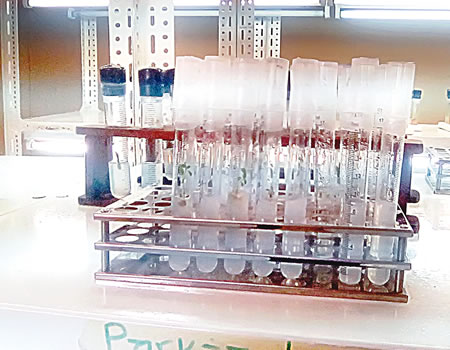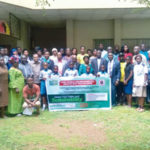
Part of the mandate of the Biotechnology Department of the Forestry Research Institute of Nigeria (FRIN) is to mass propagate forestry species, fruit tree species, medicinal plants, both indigenous and exotic (imported) species, saysFRIN’s Principal Research Officer and Head of Biotechnology Section, BabatopeOlomola.
In an interview with Nigerian Tribune, he said FRIN’s afforestation project helps reduce the effect of climate change on the environment. “This section was set up to solve a lot of problems that have to do with afforestation.”
He explains further: “If you look at the International Union for Conservation of Nature(IUCN) list, there are a lot of species that are endangered, getting extinct, or threatened in the sense that people are just going to the forest, cutting them down and not replanting.
“Some of these species have economic importance, and they take years in order to grow and mature again.
“So, one of the things this (biotechnology) section is to solve is to reduce the gestation period of these plants (trees) and also re-establish plantations for them where we discover the plantations are no longer existing.
“Through tissue culture technique, we can produce these species en masse.
“Among our achievements is that most of these tree species have not been grown in vitro that is, in tubes anywhere in the world. That is some of these were done originally here in Nigeria in this section. Over the years we have worked on a number of species.
“We have developed protocols that is we have mixed certain nutrients together that will support their growth in tubes.
“Part of the mandate of this section is germ plasm preservation/conservation, that is preservation of varieties that are going into extinction.
“After we have cultured the species in tubes we have what is called nitrogen tank where we can keep these species and they will be intact for over 100 years. This is so that after we may have left the world, and we want scientists to work on these species as they were originally, it can be done. Even if there is a crisis and the forests are destroyed, they can go into the tanks and start mass producing the species on the field.”
ALSO READ; ASUU appeal to FG to return N20bn revitalisation fund, may go on strike
To meet this target of afforestation, FRIN’s growth room has been expanded to accommodate more species.
According to Olomola, “We have worked on more than 30 species in the last 10 years, and we have had breakthroughs in all these species; we have developed protocols for them.
“Naturally, crops like banana and plantain will in sandy soil, and maize will grow well in loamy soil. From experience of our farmers, we know which is the best soil to grow these crops. Similarly, we have known the right media to prepare to grow the right crops artificially without endangering the environment. This makes the seedlings readily available. The advantage is that we don’t wait for planting season. We can work all year round to propagate these seedlings. You can ask for this number of seedlings and we can tell you that you will get it in this period of time.”





